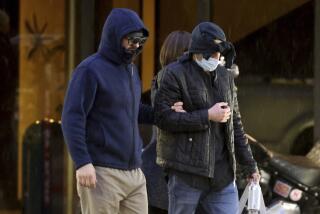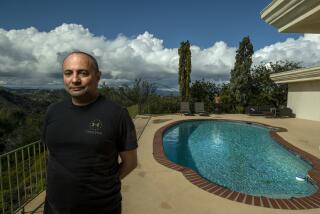Zhirinovsky a Riddle to World--and Russia Too : Politics: The right-wing demagogue’s election triumph has put him under scrutiny. But just who is he?
- Share via
MOSCOW — Is Vladimir V. Zhirinovsky a KGB agent or isn’t he? Is he or isn’t he a self-denying Jew? Is he or isn’t he a beneficiary of neo-Nazi funding from Germany? Is he or isn’t he mentally ill?
As Moscow columnist Alexander Minkin put it: “He’s terrible! The whole world is holding its breath. . . . And before whom? Who is he? The devil knows!”
For all the countless hours that he has spoken nonstop, Zhirinovsky--the ultranationalist demagogue whose success in Dec. 12 elections put an ominous new face on Russian politics--remains in many ways a mystery, not only to the world but to his own people.
The life story he has presented, in statements and in his book, “The Last Dash South,” is full of holes. He is known to lie brazenly, to deny statements he has made, to promise the impossible. Now, a key question in the wake of his sensational election success is whether any of his falsehoods will catch up with him, whether the dark side of his biography will discredit him enough to stop his political rise.
Among the most damaging of the accusations against Zhirinovsky is that he was--and may still be--a hireling of the KGB. The allegations have mounted to the point that Zhirinovsky, 47, a lawyer, said he obtained special disclaimers from the Soviet spy agency announcing that he has never been an agent or stoolie.
But the very idea of such a disclaimer, former KGB chief Viktor Ivanenko told The Times, is “nonsense. The KGB has not given out such notes.”
Judging by Zhirinovsky’s background, his knowledge of several languages and extroverted personality, Ivanenko said, “Without a doubt, he was a person who would have interested the intelligence services. He would have been an interesting person. But as for proof . . . of course there’s no proof.”
In any case, Ivanenko said, Zhirinovsky would have been a bad agent, too self-absorbed and erratic; he would have recalled the intelligence maxim that “The only thing worse than a fool is a fool with initiative.”
It is enough for most Russians to read Zhirinovsky’s book, with its accounts of how he traveled to Turkey, France and elsewhere at a time when ordinary Soviet citizens were kept at home, to become convinced he had KGB ties. He studied at the prestigious Institute for the Countries of Asia and Africa, which was considered a feeder for Soviet intelligence services.
Gleb Yakunin, long a dissident Russian Orthodox priest and now a lawmaker, said he expects Russian President Boris N. Yeltsin, who dissolved the KGB’s successor agency on Tuesday, to open its archives “and find the Zhirinovsky file so that the whole country, and his party too, can see what he was in reality.”
Yakunin also pointed to a later incident in Zhirinovsky’s career that suggests KGB ties. In 1990, a mysterious “centrist bloc” suddenly appeared in the Soviet Parliament, led by the hitherto obscure Zhirinovsky. Although he then was not even a Parliament member, Zhirinovsky was immediately invited to the Kremlin to meet with Vladimir A. Kryuchkov, the Parliament chairman and then-KGB chief.
Despite these and other signs of KGB connections, Zhirinovsky and his backers remain staunch in their denials. “I have known Vladimir Volfovich for more than 10 years now, and I must say that all allegations about him having anything to do with the KGB are totally groundless,” said Stanislav Zhebrovsky, deputy chairman of Zhirinovsky’s misleadingly named Liberal Democratic Party of Russia.
Suspicions of Zhirinovsky’s KGB ties overlap with another potentially explosive subject: his involvement in the late 1980s with the creation of the “Shalom” Jewish cultural center in Moscow. Several Moscow Jewish activists clearly recall that Zhirinovsky participated enthusiastically in the center’s launch and offered his legal services in writing its charter.
Tancred Golenpolsky, editor of the Jewish Gazette newspaper, said he has the protocols of Shalom, founded in late 1988. He said they list Zhirinovsky as head of the sections on law, philosophy and religion, history and foreign economic ties. Golenpolsky said he believes that Shalom was set up either by the KGB or the Communist Party to split the liberal Jewish movement in the Soviet Union.
Yefim Beider, a writer and former member of Shalom, said he saw Zhirinovsky at the group’s first session, when the organization’s charter was discussed. Beider recalled: “All of a sudden, a young gentleman rose from the audience and said in a loud voice: ‘I know how charters are written. I am a professional in this sphere. I am a lawyer by education. So please entrust me with this.’ ”
Beider said he had suspicions then that the KGB was “standing behind” Zhirinovsky.
But one thing is certain, he said: “At that time, he considered himself a Jew. He came to us, which proved he was a Jew-- all our members and everybody who we assigned to do any work for us were naturally Jews.”
If, however, he ever considered himself a Jew, Zhirinovsky no longer does. He has denied that his father--with the usually Jewish name of Volf--is Jewish. In his political statements, Zhirinovsky sometimes crosses the line into anti-Semitism.
Zhebrovsky denied that Zhirinovsky had ever played a significant role in the Shalom center, allowing only that he might have spoken there because he was eager to find a spot to preach his political views.
If it were proven that his father was Jewish, the disclosure might harm Zhirinovsky’s standing among some ultranationalists who support him; their beliefs include a heavy measure of anti-Semitism.
But more to the point, as columnist Minkin wrote in the daily Moskovsky Komsomolets, is that “Russia has always hated people who deny their own fathers. If you betrayed your father, you’ll betray the Fatherland too.”
Zhirinovsky also denies strenuously that there was anything fishy about his campaign financing, though the hours of prime-time television he bought bespoke mind-boggling sums. He claims that virtually all his money came from ordinary supporters. He said at one point that he had spent about 1 billion rubles--almost $1 million--on the campaign and owes $200,000 for TV time.
This is one mystery that may never be solved, because Russian campaign-finance laws are so fuzzy and permissive; officials admit they are unable to prove improper funding from outside sources. The laws appear to require disclosure only of how campaigns spend government money they receive.
But Andrei Zavidiya, a businessman and Zhirinovsky’s running mate in the 1991 presidential campaign, claims he and his conglomerate, known as Galand, provided much of Zhirinovsky’s financing. Now, Zavidiya told the Itar-Tass news agency, they have had a falling-out and he has cut off the money and Zhirinovsky “is in debt up to his ears.”
But German media report that Zhirinovsky has received money from like-minded right-wingers there and in Austria; Zhirinovsky’s visit last week to extremist publisher Gerhard Frey and former Waffen SS member Edwin Neuwirth appeared to confirm their close relations.
What ticks inside Zhirinovsky may be the toughest question of all.
He strikes many as partly mad. Minkin, in his examination of Zhirinovsky’s character, said he seemed “Either a schizophrenic (typical speech: fast, without thinking, tense . . . ) or a paranoid (everywhere are enemies, enemies, enemies).”
Zhirinovsky’s description of his childhood in “The Last Dash South” is disturbing but far from obviously pathological. He describes hunger and deprivation in a one-room apartment shared with his mother, a stepfather and five other children in the Kazakhstan capital of Alma-Ata.
The book ends with an apocalyptic vision, glorious to him but terrifying too for its implications: “I see Russian soldiers, gathering for this last southern crusade,” he writes. “I see submarines surfacing by the shores of the Indian Ocean and paratroop ships approaching the shores, along which the soldiers of the Russian army are already marching, armored personnel carriers moving, enormous masses of tanks advancing. At last, Russia is completing its last military crusade. . . . “
More to Read
Sign up for Essential California
The most important California stories and recommendations in your inbox every morning.
You may occasionally receive promotional content from the Los Angeles Times.













